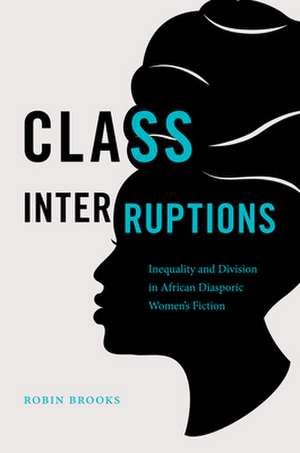Class Interruptions
Autor Robin Brooksen Limba Engleză Paperback – 31 ian 2022
Through interviews with authors, textual analyses of the fiction, and a diagramming of cross-class relationships, Brooks offers compelling new insight on literary portrayals of class inequalities and division. She expands the scope of how the Black women's literary tradition, since the 1970s, has been conceptualized by repositioning the importance of class and explores why the imagination matters as we think about novel ways to address long-standing and simultaneously evolving issues
| Toate formatele și edițiile | Preț | Express |
|---|---|---|
| Paperback (1) | 206.50 lei 6-8 săpt. | |
| University of North Carolina Press – 31 ian 2022 | 206.50 lei 6-8 săpt. | |
| Hardback (1) | 540.34 lei 6-8 săpt. | |
| The University of North Carolina Press – 27 feb 2022 | 540.34 lei 6-8 săpt. |
Preț: 206.50 lei
Nou
Puncte Express: 310
Preț estimativ în valută:
39.52€ • 41.69$ • 32.94£
39.52€ • 41.69$ • 32.94£
Carte tipărită la comandă
Livrare economică 02-16 ianuarie 25
Preluare comenzi: 021 569.72.76
Specificații
ISBN-13: 9781469666471
ISBN-10: 1469666472
Pagini: 238
Dimensiuni: 156 x 234 x 14 mm
Greutate: 0.37 kg
Editura: University of North Carolina Press
ISBN-10: 1469666472
Pagini: 238
Dimensiuni: 156 x 234 x 14 mm
Greutate: 0.37 kg
Editura: University of North Carolina Press
Descriere
As downward mobility continues to be an international issue, Robin Brooks offers a timely intervention between the humanities and social sciences by examining how Black women's cultural production engages debates about the growth in income and wealth gaps in global society during the late twentieth- and early twenty-first centuries.
